Introduction
Pineapple juice, with its refreshing tropical flavor and numerous health benefits, is a popular choice for smoothies, cocktails, and health drinks. While it’s rich in vitamins, antioxidants, and bromelain, its unique properties can create unfavorable reactions when combined with certain foods and beverages. Understanding what not to mix with pineapple juice is essential for ensuring both flavor harmony and digestive health.
In this article, we’ll explore the combinations to avoid and explain the science behind why some pairings just don’t work. You’ll also find tips for smart pairings that enhance the taste and benefits of pineapple juice.
Understanding Food Pairings and Compatibility
Pineapple juice is a deliciously tangy beverage that many people love for its refreshing taste and nutritional benefits. However, not all foods and drinks pair well with it. Understanding the science behind food pairings can help you avoid digestive discomfort and optimize the health benefits of this tropical treat.
The Science Behind Food Pairings
Importance of Digestive Enzyme Compatibility
The human digestive system relies on enzymes to break down food into nutrients the body can absorb. Pineapple juice contains a unique enzyme called bromelain, which aids in breaking down proteins. While bromelain is beneficial for digestion, it can interact negatively with certain foods. For example, when paired with dairy products, the enzyme’s reaction may cause curdling, leading to an unappetizing texture and potential digestive issues.
Additionally, foods rich in other enzymes or complex carbohydrates may conflict with bromelain’s activity, creating an imbalance in digestion. This makes it crucial to understand enzyme compatibility when pairing pineapple juice with other ingredients.
How Acidity Affects Digestive Processes
Pineapple juice is highly acidic due to its natural citric acid content. Acidity plays a key role in digestion by breaking down food in the stomach. However, combining highly acidic foods or beverages can overwhelm the digestive system. For instance, mixing pineapple juice with other citrus juices like orange or lemon intensifies acidity, potentially causing acid reflux, bloating, or an upset stomach.
The high acidity of pineapple juice can also disrupt the natural pH balance of the stomach when combined with alkaline foods, leading to digestive discomfort.
Common Mistakes in Mixing Pineapple Juice with Other Foods
Common Food Pairing Myths and Misconceptions
A widespread misconception is that pineapple juice can be paired with any food because of its sweet and tangy flavor. However, science shows that not all combinations work well. For instance, while it’s tempting to add pineapple juice to creamy desserts or protein-rich dishes, the results are often unpalatable or difficult to digest.
Another common myth is that pineapple juice enhances the flavor of all smoothies. While it pairs wonderfully with tropical fruits like mango and banana, it doesn’t blend well with highly acidic fruits such as grapefruit, as this combination may overpower the palate and irritate the stomach.
Foods You Should Avoid Mixing with Pineapple Juice
The way foods interact with pineapple juice can influence both taste and digestion. Avoiding incompatible combinations ensures a more enjoyable and healthy experience.
Dairy Products
The Interaction Between Pineapple Juice and Milk
Mixing pineapple juice with milk is one of the most common mistakes. The acidity of the juice reacts with milk proteins, causing them to curdle. This curdling creates an unpleasant texture and can lead to indigestion. While it might seem like a creative idea for smoothies, this combination is best avoided.
Why Yogurt and Pineapple Juice Don’t Mix Well
Yogurt, a fermented dairy product, reacts similarly to milk when combined with pineapple juice. The bromelain enzyme breaks down proteins in yogurt, leading to separation and curdling. The result is an undesirable consistency that ruins the intended texture of smoothies or desserts. If you enjoy yogurt-based drinks, consider substituting pineapple juice with milder fruit options like mango or banana to maintain the creamy consistency.
 Protein-Rich Foods
Protein-Rich Foods
Pineapple Juice and Meat Marination
While pineapple juice is often used as a meat tenderizer, overusing it can lead to undesirable results. Bromelain breaks down proteins in the meat, making it tender. However, marinating for too long can make the meat overly mushy, losing its texture and appeal.
For optimal results, limit the marination time to under 30 minutes. This way, you’ll achieve tender meat without compromising its structure.
How Pineapple Juice Impacts Protein Absorption
Consuming protein-rich meals with pineapple juice may reduce the body’s ability to absorb nutrients effectively. Bromelain’s active breakdown of proteins in the stomach can interfere with proper digestion, leading to incomplete protein absorption. While this isn’t a significant issue in small amounts, regular or excessive pairing of pineapple juice with protein-heavy dishes should be avoided.
Acidic Beverages
The Effect of Combining Citrus Juices
Pineapple juice is already highly acidic, and combining it with other acidic juices like orange, lemon, or grapefruit can overwhelm your digestive system. This pairing increases the risk of acid reflux, heartburn, or an upset stomach, especially in individuals with sensitive digestion.
Instead, balance pineapple juice with sweeter or less acidic fruits like papaya or watermelon for a refreshing blend.
Coffee and Pineapple Juice: A Recipe for Disaster
Coffee and pineapple juice are two beverages you wouldn’t typically pair—and for good reason. The bitterness of coffee clashes with the sweetness of pineapple juice, creating an unpleasant flavor profile. Additionally, the acidity in both beverages can irritate your stomach, leading to discomfort.
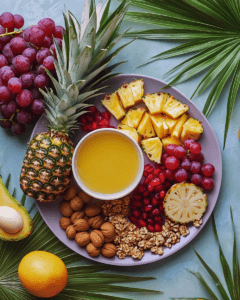
Health Implications of Incompatible Mixes
Pairing pineapple juice with certain foods and beverages might not only impact flavor but can also lead to health concerns. Understanding the potential digestive and allergenic effects is essential for making safe and enjoyable food choices.
Digestive Problems from Bad Pairings
Symptoms and Side Effects
When pineapple juice is mixed with incompatible ingredients, it can cause immediate digestive discomfort. Common symptoms include bloating, nausea, acid reflux, or cramping. For instance, combining pineapple juice with milk results in curdling, which is difficult for the stomach to process, leading to indigestion.
Highly acidic combinations, such as pairing pineapple juice with citrus drinks or coffee, can exacerbate acid reflux in sensitive individuals. The acidity overwhelms the stomach’s natural balance, resulting in discomfort or heartburn.
Long-Term Risks of Repeated Mistakes
Continually consuming poorly paired foods with pineapple juice can lead to chronic digestive issues. Over time, the stomach lining may become irritated due to consistent exposure to excessive acidity. This irritation can result in gastritis or ulcers if left unchecked.
Additionally, improper digestion caused by incompatible pairings may reduce nutrient absorption. For example, when bromelain in pineapple juice breaks down proteins too rapidly, the body may miss out on essential amino acids.
Allergenic Reactions
How Some Combinations Can Trigger Allergies
Pineapple juice contains natural allergens that can intensify when combined with certain foods. For example, dairy products like milk and yogurt can amplify allergic reactions caused by pineapple’s bromelain enzyme. Symptoms may include swelling, hives, or difficulty breathing in severe cases.
Alcoholic beverages can also interact with pineapple juice to heighten allergic responses. The combination might overstimulate histamine release, leading to skin irritation or nasal congestion.
Preventing Accidental Reactions with Better Choices
To avoid allergenic reactions, it’s essential to test small quantities of new combinations before consuming them in larger portions. Pair pineapple juice with neutral or hypoallergenic ingredients, such as non-dairy milks (almond or oat milk) or mild fruits like apples and pears.
Being aware of your body’s reactions to specific foods can help you identify and prevent potential allergens early. Always consult with a healthcare professional if you suspect a food allergy.
Smarter Approaches to Pineapple Juice Pairings
Balancing Acidity with Neutral Ingredients
Pairing pineapple juice with neutral ingredients such as coconut water, bananas, or spinach can balance its acidity while enhancing its flavor. These combinations are gentle on the stomach and reduce the risk of acid reflux or digestive upset.
Using Pineapple Juice in Cooked Recipes
Cooking with pineapple juice changes its chemical properties, reducing its acidity and bromelain activity. This makes it a safer option for recipes involving dairy or protein-rich foods. For example, using pineapple juice as a glaze for baked chicken allows you to enjoy its flavor without digestive concerns.
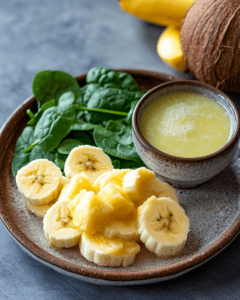
Smart Pineapple Juice Pairings
While some combinations with pineapple juice can cause issues, there are plenty of options that not only taste great but also enhance its nutritional benefits. Let’s explore the best pairings and address frequently asked questions.
Fruits That Complement Pineapple Juice
Ideal Fruits for Smoothies
Pineapple juice pairs beautifully with fruits that have a mild sweetness and low acidity. Banana, mango, and papaya are excellent choices. These fruits balance the tangy flavor of pineapple while maintaining a creamy, smooth consistency in beverages.
Adding frozen berries like strawberries or blueberries can also work well. They bring a refreshing twist to pineapple smoothies without overpowering the base flavor.
Creative Ways to Use Pineapple Juice in Recipes
Pineapple juice can be a star ingredient in tropical recipes. Use it in salad dressings with olive oil and honey, or as a base for marinades with ginger and garlic. Its natural sweetness also complements desserts like fruit sorbets or jellies.
Safe and Healthy Beverage Combinations
Pairing Pineapple Juice with Herbal Teas
For a calming and refreshing beverage, mix pineapple juice with herbal teas such as chamomile or mint. These combinations soothe the stomach while enhancing the overall flavor. You can enjoy this mix hot or cold, depending on the season.
The Best Mocktail Ideas
Pineapple juice is a versatile ingredient for mocktails. Combine it with sparkling water and a dash of grenadine for a festive drink, or mix it with coconut water and lime for a tropical punch. These combinations are light, hydrating, and perfect for any occasion.
Frequently Asked Questions About Pineapple Juice Pairings
What is the benefit of pineapple juice for ladies?
Pineapple juice is particularly beneficial for women due to its rich nutrient profile. It contains bromelain, which can help reduce menstrual cramps and bloating by aiding digestion and reducing inflammation. Additionally, its high vitamin C content boosts collagen production, supporting healthy skin and hair. Pineapple juice is also hydrating and can promote better hydration levels, crucial for maintaining energy and hormonal balance.
What does mixing ginger and pineapple do?
Combining ginger and pineapple creates a powerful blend with numerous health benefits. Ginger enhances digestion and reduces nausea, while pineapple juice provides bromelain, which aids in breaking down proteins. Together, they support a healthy digestive system, reduce inflammation, and may help boost immunity. This combination is also popular for relieving sore throats and improving circulation due to their anti-inflammatory properties.
Why Does Pineapple Juice React with Some Foods?
Pineapple juice’s acidity and bromelain enzyme cause it to react with certain foods, especially dairy and proteins. These reactions can alter textures, flavors, and digestive processes, making some pairings unsuitable.
Can Cooking Pineapple Juice Change Its Compatibility?
Yes, cooking pineapple juice reduces its bromelain activity and acidity, making it less likely to react with dairy or proteins. For example, cooked pineapple juice in a glaze or sauce is safe to use with chicken or pork dishes.
How Can I Test for Food Pairing Issues?
Start by trying small portions of new pineapple juice combinations to see how your body reacts. If you experience digestive discomfort or allergic symptoms, discontinue the pairing. Consulting a nutritionist can also help identify better alternatives.
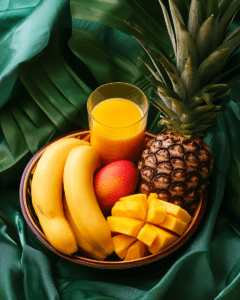
Conclusion
Understanding what not to mix with pineapple juice is key to enjoying it without complications. Avoid dairy, overly acidic beverages, and incompatible proteins to prevent digestive discomfort and allergenic reactions. Opt for smarter pairings like bananas, herbal teas, or cooked recipes to enhance the flavor and benefits of pineapple juice.
By being mindful of food compatibility, you can make the most of this tropical favorite while ensuring a delightful and healthy experience.
This guide explores what not to mix with pineapple juice, while offering suggestions for internal links from related articles on Delighted Recipes to enrich your experience.
Learn about the benefit of pineapple juice for ladies to discover its unique health benefits for women.
Explore creative pineapple juice recipes for delicious pairings.
Explore what fruits pair with carrots for additional smoothie inspiration.

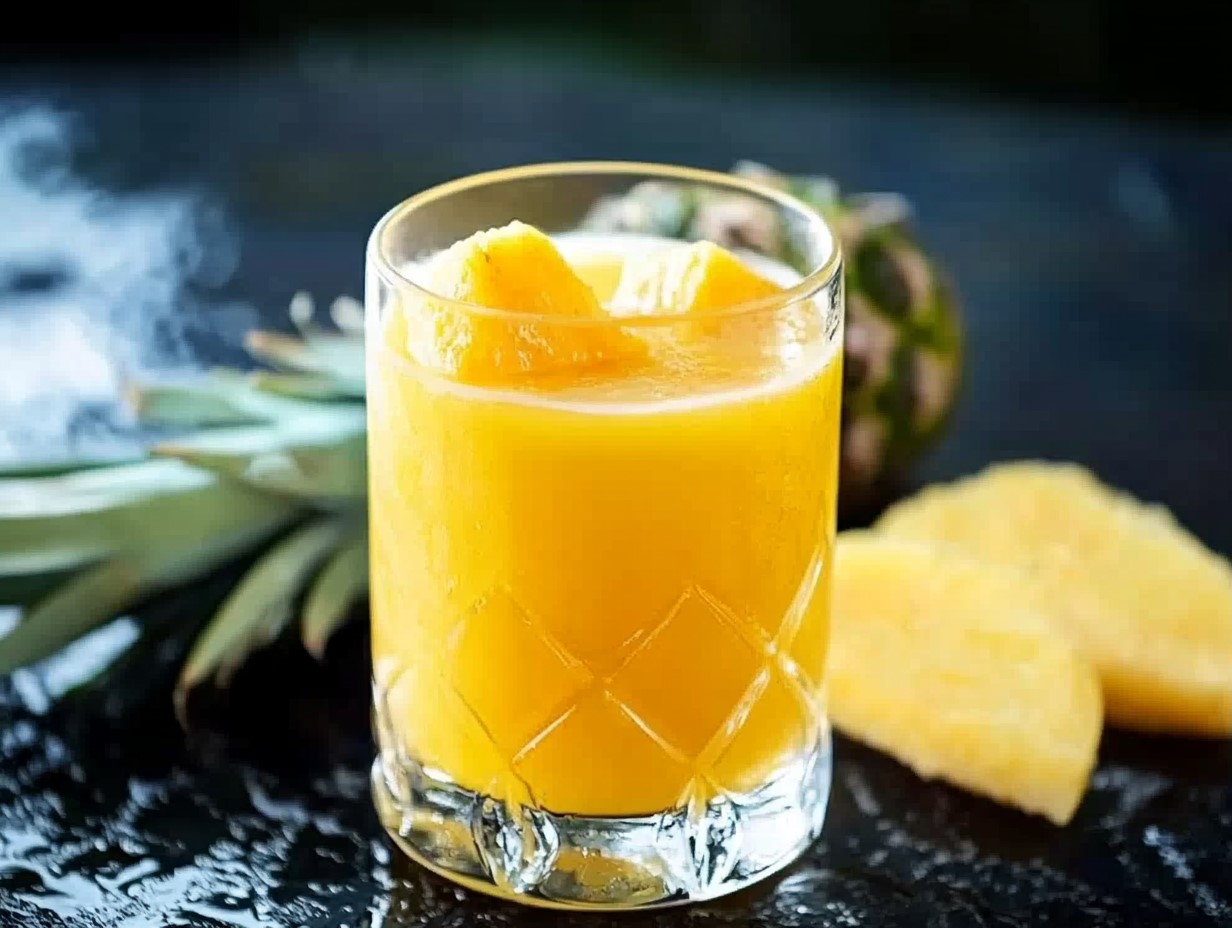
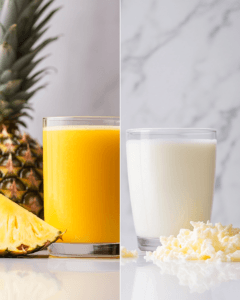 Protein-Rich Foods
Protein-Rich Foods